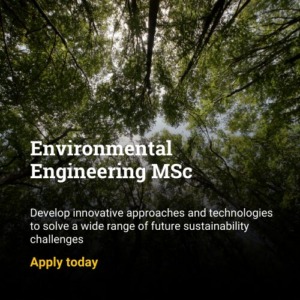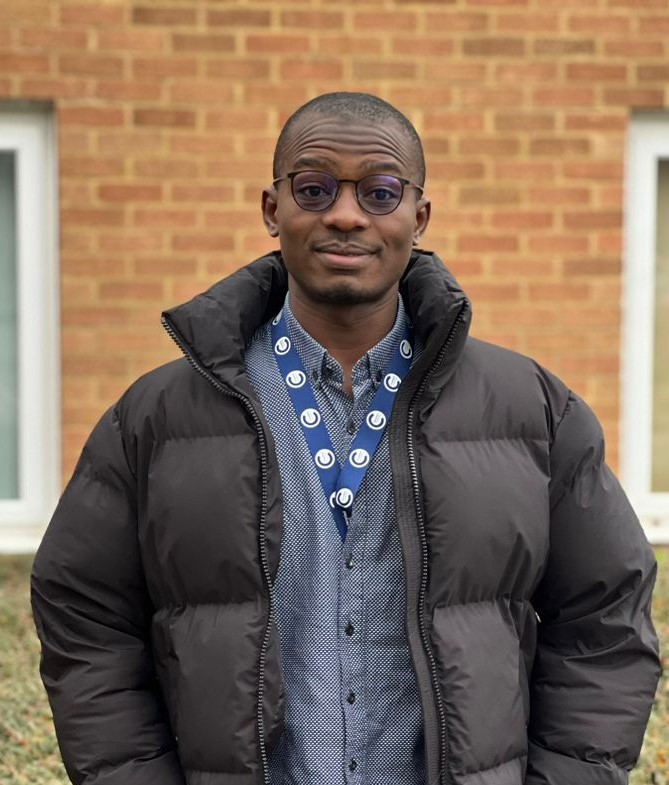My journey as a Cranfield Environmental Engineering MSc student
19/03/2024

Excited, surprised, and overjoyed are just a few of the emotions I experienced upon receiving the life-changing news that I had been awarded a fully funded scholarship to study at Cranfield University. It left me in a state of joyful disbelief, as I eagerly embraced the incredible opportunity that lay before me.
I am Ahmad Idris, I am from Nigeria, I am currently studying an MSc in Environmental Engineering at Cranfield University.
I completed my bachelors in engineering at Ahmadu Bello University in 2020, where I studied water resources and environmental engineering. My fascination with the critical roles water and the environment plays in human and capital development has been a driving force throughout my academic journey. Following my undergraduate studies, I gained valuable experience through brief stints at a software engineering firm and a university, where I discovered the potential of technology to address environmental challenges. This exposure sparked my passion for exploring innovative solutions at the intersection of technology and sustainability. With this background, I was always enthusiastic about furthering my education in this field, eager to deepen my knowledge and contribute to impactful environmental projects.
Choosing Cranfield University wasn’t just a lucky draw, it was a full-on love affair! I practically stalked their website, clicking through page after page like a kid in a candy store. I had secured admission at Cranfield twice (in separate years), I got the scholarship with the second application. Seriously, I wouldn’t be amazed if I set a record for the most website visits in a month!
I was motivated to choose Cranfield out of four other universities I got admitted into for their reputation in ground-breaking research in Water and Environment, their global impact on developmental projects, portfolio of their staff, connections with industries, the meticulously crafted course structure, and the rich content of their modules.
What have you enjoyed most about your course so far?
So far so good, I believe my expectations were fully met. One of the things I enjoyed the most is the blend of teaching methods explored in my course, we had every module taught by a seasoned professional in the field, a site visit to an industrial partner or an in-class industry-led session i.e. where experts from the industry come to the classroom to enlighten us about their work and how it relates to what we are studying, challenges they are facing and how they are addressing them.
My group project is in an area dear to me, I am working with other team members from two MSc courses to develop a robust and scalable GIS database of lowland agricultural peat while also performing a natural capital account of the Flit Valley, Bedfordshire, supported by the Greensand Trust UK, supervised by Professors Stephen Hallet and Dr Daniel Simms. The interdisciplinary nature of this project, using the subject knowledge acquired in class, technical skills developed and some client-oriented business skills is what appeals to me the most.
I enjoy the personal and professional development sessions organised as part of the course, such as seminars on academic writing, consultancy report writing, public speaking and presentation skills, project management, team work, emotional intelligence among others, including on careers as well.
Additionally, Cranfield provides ample opportunities to connect with new people and establish professional bonds useful during and after studies. The staff are supportive and you can always pop-in to their office or send an email, I recall one of my lecturers telling us, “knock on my door when we need to…oops, I work in an open office, I don’t have a door.
How has the AGIP scholarship helped you?
Receiving the prestigious AGIP scholarship has been nothing short of transformative for both my career trajectory and my commitment to national development. It not only provided me with the financial support to pursue my academic aspirations but also granted me access to a network of industry professionals and mentors. Through AGIP’s guidance and resources, I’ve been able to hone my skills and broaden my horizons to be able to contribute meaningfully to projects that would advance national development in my country and countries around the globe. This scholarship isn’t just about individual success; it’s a catalyst for collective progress, empowering scholars like myself to make tangible impacts that resonate far beyond our own ambitions. I remain profoundly grateful to the Nigeria AGIP Oil company for recognizing my potential and deeming me worthy of this sponsorship. I am committed to supporting the company’s endeavours, ensuring that their mission continues to be upheld with dedication and excellence.
How did the Cranfield regional office and admissions help you with the application process?
The regional office was instrumental in my decision to choose Cranfield University. The seminars and Q&A sessions they organised, their prompt and supportive responses were a beacon of reassurance, guiding me through the decision-making process with confidence. I vividly recall a critical moment in my journey when I received confirmation of my scholarship on a Friday, with the CAS application deadline looming just a few days later on Tuesday. Initially, I had contemplated withdrawing my admission, but circumstances changed, and I urgently needed to retrieve it to proceed with my CAS application. Amidst this time-sensitive situation, the regional office exemplified unparalleled dedication. Throughout the weekend, we engaged in a flurry of correspondence, with them promptly responding to my emails, even during non-business hours. Their unwavering assistance and commitment to my success during this crucial period were truly remarkable. I am immensely grateful to the regional office for their exceptional support and unwavering dedication.
What do you think are the benefits of studying in the UK?
There are several advantages to studying in the UK which greatly enhance both intellectual and personal growth. Numerous UK universities are frequently ranked among the top in the world, demonstrating the country’s longstanding heritage of intellectual brilliance. In the UK, students have access to top-notch instructors, state-of-the-art research facilities, and a wide variety of academic programmes designed to satisfy the needs of the global workforce of today. Studying in the UK also offers a multicultural experience, introducing you to other viewpoints and cultures that promote global cooperation and understanding.
Also, there are a ton of options for extracurricular activities, networking, and personal development in the dynamic cities of the UK.
All things considered, pursuing an education in the UK not only enriches your learning experience but also gives you the tools, skills, knowledge, and experiences necessary to thrive in an increasingly interconnected world.
Categories & Tags:
Leave a comment on this post:
You might also like…
From classroom to cockpit: What’s next after Cranfield
The Air Transport Management MSc isn’t just about learning theory — it’s about preparing for a career in the aviation industry. Adit shares his dream job, insights from classmates, and advice for prospective students. ...
Setting up a shared group folder in a reference manager
Many of our students are now busy working on their group projects. One easy way to share references amongst a group is to set up group folders in a reference manager like Mendeley or Zotero. ...
Company codes – CUSIP, SEDOL, ISIN…. What do they mean and how can you use them in our Library resources?
As you use our many finance resources, you will probably notice unique company identifiers which may be codes or symbols. It is worth spending some time getting to know what these are and which resources ...
Supporting careers in defence through specialist education
As a materials engineer by background, I have always been drawn to fields where technical expertise directly shapes real‑world outcomes. Few sectors exemplify this better than defence. Engineering careers in defence sit at the ...
What being a woman in STEM means to me
STEM is both a way of thinking and a practical toolkit. It sharpens reasoning and equips us to turn ideas into solutions with measurable impact. For me, STEM has never been only about acquiring ...
A woman’s experience in environmental science within defence
When I stepped into the gates of the Defence Academy it was the 30th September 2019. I did not know at the time that this would be the beginning of a long journey as ...









Comments are closed.